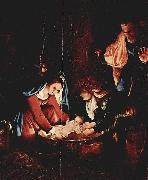Wholesale Oil Painting No Minimum |
|||||||||||
|
|
|||||||||||

|
|||||||||||
|
|
|
||||||||
Lorenzo LottoItalian 1480-1556 Lorenzo Lotto Galleries In this last period of his life, Lorenzo Lotto would frequently move from town to town, searching for patrons and commissions. In 1532 he went to Treviso. Next he spent about seven years in the Marches (Ancona, Macerata en Jesi), returning to Venice in 1540. He moved again to Treviso in 1542 and back to Venice in 1545. Finally he went back to Ancona in 1549. This was a productive period in his life, during which he painted several altarpieces and portraits : Santa Lucia before the Judge, 1532, Jesi, Pinacoteca comunale The Sleeping Child Jesus with the Madonna, St. Joseph and St. Catherine of Alexandria, 1533, Bergamo, Accademia Carrara Portrait of a Lady as Lucretia, 1533, National Gallery, London. Holy Family with SS Jerome, Anna and Joachim, 1534, Firenze, Uffizi Holy Family, ca 1537, Paris, Louvre Portrait of a Young Man, Firenze, Uffizi Crucifixion, Monte San Giusto, Church of S Maria in Telusiano Rosary Madonna, 1539, Cingoli, Church of San Nicolo Portrait of a Man, 1541, Ottawa, National Gallery of Canada Bust of a Bearded Man, 1541, ascribed, San Francisco, Fine Arts Museum The Alms of Saint Anthony, 1542, Venezia, church SS Giovanni e Paolo Madonna and four Saints, 1546, Venezia, Church of San Giacomo dell??Orio Portrait of fra?? Gregorio Belo da Vicenza, 1548,New York, Metropolitan Museum Assumption, 1550, Ancona, church San Francesco alle Scale The Crossbowman, 1551, Rome, Pinacoteca Capitolina Portrait of an Old man, ascribed, ca 1552, Saint Petersburg, Ermitage Presentation in the Temple, 1555, Loreto, Palazzo Apostolico A Venetian woman in the guise of Lucretia (1533).At the end of his life it was becoming increasingly difficult for him to earn a living. Furthermore, in 1550 one of his works had an unsuccessful auction in Ancona. As recorded in his personal account book, this deeply disillusioned him. As he had always been a deeply religious man, he entered in 1552 the Holy Sanctuary at Loreto, becoming a lay brother. During that time he decorated the basilica of S Maria and painted a Presentation in the Temple for the Palazzo Apostolico in Loreto. He died in 1556 and was buried, at his request, in a Dominican habit. Giorgio Vasari included Lotto's biography in the third volume of his book Vite. Lorenzo Lotto himself left many letters and a detailed notebook (Libro di spese diverse, 1538-1556), giving a certain insight in his life and work. Among the many painters he influenced are likely Giovanni Busi |
||||||||
|
|
||||||||
Christi Geburt
Christi Geburt Painting ID:: 82719 |
1527-1528
Medium Oil on wood
Dimensions Deutsch: 42 x 56 cm
cyf 1527-1528 Medium Oil on wood Dimensions Deutsch: 42 x 56 cm cyf |
|||||||
|
|
||||||||
|
Hans Memling Netherlandish Northern Renaissance Painter, ca.1435-1494 Born in Seligenstadt, near Frankfurt in the Middle Rhein region, it is believed that Memling served his apprenticeship at Mainz or Cologne, and later worked in the Netherlands under Rogier van der Weyden (c. 1455?C1460). He then went to Bruges around 1465. There is an apocryphical story that he was a wounded at the Battle of Nancy, sheltered and cured by the Hospitallers at Bruges, and that to show his gratitude he refused payment for a picture he had painted for them. Memling did indeed paint for the Hospitallers, but he painted several pictures for them, in 1479 and 1480, and it is likely that he was known to his patrons of St John, prior to the Battle of Nancy. Memling is connected with military operations only in a distant sense. His name appears on a list of subscribers to the loan which was raised by Maximilian I of Austria, to defend against hostilities towards France in 1480. In 1477, when he was incorrectly claimed to have been killed, he was under contract to create an altarpiece for the gild-chapel of the booksellers of Bruges. This altarpiece, under the name of the Seven Griefs of Mary, is now in the Gallery of Turin. It is one of the fine creations of his more mature period. It is not inferior in any way to those of 1479 in the hospital of St. John, which for their part are hardly less interesting as illustrative of the master's power than The Last Judgment which can be found since the 1470s in the St. Mary's Church, Gda??sk. Critical opinion has been unanimous in assigning this altarpiece to Memling. This affirms that Memling was a resident and a skilled artist at Bruges in 1473; for the Last Judgment was undoubtedly painted and sold to a merchant at Bruges, who shipped it there on board of a vessel bound to the Mediterranean, which was captured by Danzig privateer Paul Beneke in that very year. This purchase of his pictures by an agent of the Medici demonstrates that he had a considerable reputation. Christi Geburt c. 1470 Medium oil on panel Dimensions Deutsch: 29 x 21,5 cm cjr |
||||||||
|
|
||||||||
|
Prev Next
|
||||||||
|
|
||||||||
|
Related Paintings to Hans Memling :. |
||||||||
|
|
||||||||
|
CONTACT US |

